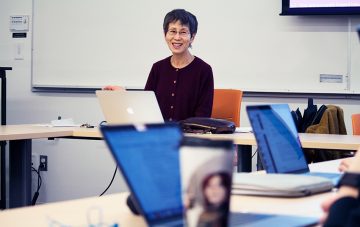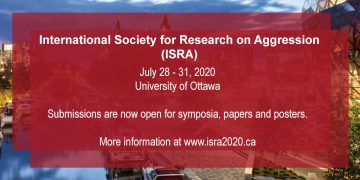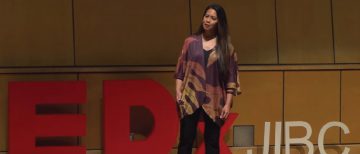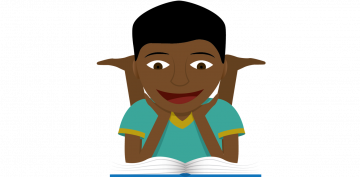Interview with Dr. Ryuko Kubota, Language and Literacy Education: Questioning the Belief that English is a Universal Common Language
January 28, 2020

Is English a universal language, proficiency in which guarantees a successful career? Or is this a language myth that needs to be set right?
Dr. Ryuko Kubota and her research team interviewed 50 transnational workers between 2011 to 2016 to investigate. She discusses her findings, as well as the gaps between policy and scholarship when it comes to language education, and her current work in this area.
Read the full story here.
Black Activism in Education and Community: Exposing Anti-Black Racism in Vancouver with Shelby McPhee
February 6, 2020
When: Thursday, 6 February 2020 | 6:30 – 8:30 pm
Where: UBC Robson Square Theatre
Join us for a series of events on Black Activism in Education and Community as we showcase examples of how Black communities have responded to racism in Vancouver and in Canada.
Recent and ongoing incidents in Vancouver and Canada illustrate that anti-Black racism is very much a local reality. Black communities that include activists, artists and academics have a long history of working to create new narratives, analyses and immersive experiences that shift this reality.
This event highlights the thinking and efforts of Black communities, and aims to expand the public conversation and prompt non-Black communities to act in effective solidarity to dismantle anti-Black racism.
Our special guest for this event is Shelby McPhee, a recent graduate of Acadia University, who will share stories and comments on how to recognize and address anti-Black racism.
The event is jointly hosted by the
- UBC Black Caucus,
- Centre for Culture, Identity and Education, and
- the Equity & Inclusion Office.
Free, but registration is required. Light dinner and refreshments provided. Music by DJ Denise.
Black Activism in Education and Community: Asserting Black Presence in Canada with Dr. OmiSoore Dryden
March 2, 2020
When: Monday, 2 March 2020 | 6:30 – 8:30 pm
Where: UBC Robson Square HSBC Hall
Join us for a series of events on Black Activism in Education and Community as we showcase examples of how Black communities have responded to racism in Vancouver and in Canada.
Recent and ongoing incidents in Vancouver and Canada illustrate that anti-Black racism is very much a local reality. Black communities that include activists, artists and academics have a long history of working to create new narratives, analyses and immersive experiences that shift this reality.
This event highlights the thinking and efforts of Black communities, and aims to expand the public conversation and prompt non-Black communities to act in effective solidarity to dismantle anti-Black racism.
Dr. OmiSoore Dryden, James R. Johnston Chair in Black Canadian Studies in the Faculty of Medicine and an associate professor in the Department of Community Health and Epidemiology at Dalhousie University, will be initiating the conversation on efforts on the part of colleges, universities and communities across Canada to assert Black presence and work towards systemic change.
The event is jointly hosted by the
- UBC Black Caucus,
- Centre for Culture, Identity and Education, and
- the Equity & Inclusion Office.
Free, but registration is required. Light dinner and refreshments provided.
International Society for Research on Aggression 2020 World Meeting – Submissions Now Open

The next biennial World Meeting of the International Society for Research on Aggression will take place in Ottawa, from July 28 to July 31, 2020.
The meeting will showcase multidisciplinary research on aggressive behaviour. Submissions for oral paper presentations, poster sessions, and invited talks may be made through the submission portal.
Call for Submissions
Registration portal
TEDx talk featuring Dr. Candace Galla on Indigenous Language Revitalization

TEDx
By: Dr. Candace Galla
January 9, 2020
He pūkoʻa kani ʻāina: Creating Pathways for Indigenous Language Vitality
Dr. Candace Galla, Associate Professor
This is a story that reflects upon the small ripples that were generated at the birth of the Hawaiian language revitalization movement. The tide and current have generated waves that are now thousands of Hawaiian language speakers, and has inspired many other Indigenous language communities around the world. This is a story of hope, possibility, passion, and commitment! Candace Kaleimamoowahinekapu Galla was born and raised on the island of Hawaiʻi. At home, she was immersed in hula (Hawaiian traditional dance) and was taught by her Native Hawaiian and Filipino kumu hula (hula master) mother. From her Filipino father, she developed a deep connection to the ocean and was taught to appreciate, respect, and embrace the ocean. She learned ʻŌlelo Hawaiʻi formally at a time when there was an ideology that “learning and/or speaking Hawaiian would not be relevant in the ‘real-world’”. At the University of Arizona, she received her B.A. in Linguistics, M.A. in Native American Linguistics, and Ph.D. in Language, Reading, & Culture; she now resides in Vancouver, as an Associate Professor at the University of British Columbia. Her scholarly and professional activities, teaching, and service are reflective of her commitment to mobilize Hawaiian language medium education, and Indigenous language education and revitalization, locally, nationally, and globally.
Link to TEDx Talk.
Graduate Defence – Kathleen Warfield
Kathleen Warfield, PhD in LLED
Reading the Cuts: A Novel Posthuman Digital Visual Method for Examining Images of the Self on Social Media.
Supervisor(s): Dr. Theresa Rogers
Friday, January 24, 2020 | 12:30PM | Graduate Student Centre, 6371 Crescent Road, Room 200
International Visiting Research Scholars
Application deadline: Monday March 2, 2020.
Objectives
- To bring outstanding international scholars to UBC for extended visits, in partnership with UBC’s faculties, departments and research centres.
- To foster basic and advanced research in an interdisciplinary research environment.
- To serve as a catalyst for longer-term interdisciplinary research relationships through the Institute.
The Peter Wall Institute for Advanced Studies is offering International Visiting Research Scholars (IVRS) awards of $15,000 to bring some of the world’s best scholars to UBC.
Exceptional scholars who have achieved the highest levels of distinction in their fields, and whose work has had a broad impact well beyond any one discipline are invited to spend time at UBC and the Peter Wall Institute. Ideal candidates will have demonstrated their commitment to working across disciplinary boundaries.
The Institute will partner with UBC faculties, departments and research centres to attract outstanding scholars to UBC for an extended stay, providing opportunities to foster interdisciplinary academic exchange and catalyze new research directions between UBC and international scholars.
IVRS will spend a minimum of three weeks at UBC, with part-time residence at the Institute, during the academic term from September 2020 – May 2021.
*Host Faculty* All visiting scholars must be hosted by at least two UBC faculty members from different departments. Please download the application form for IVRS candidates.
Project Grant: Spring 2020 Competition
Registration deadline: February 5, 2020.
Deadline to submit Research Project Information Form: February 27, 2020.
Applicant’s e-submission deadline on ResearchNet: March 3, 2020.
You may continue to work on your proposal after you have submitted your paperwork to ORS. Please see ORS website for further information about eSubmission Procedures.
Sponsor deadline: March 4, 2020.
Objectives
- To support a diverse portfolio of health-related research and knowledge translation proposals at any stage, from discovery to application, including commercialization
- To promote relevant collaborations across disciplines, professions, and sectors
- To contribute to the creation and use of health-related knowledge
The Project Grant program is open to applicants in all areas of health research that are aligned with the CIHR mandate: “To excel, according to internationally accepted standards of scientific excellence, in the creation of new knowledge and its translation into improved health for Canadians, more effective health services and products, and a strengthened Canadian health care system”.
The total amount available for Fall 2019 and Spring 2020 Project Grant competitions is $550M. The Project Grant competition will also have a specific funding envelope to support early career researchers (ECRs).
Funding is augmented by CIHR Institute Priority Announcements (PAs) that award grants in specific research areas relevant to the Institutes’ mandates. PAs offer additional sources of funding for highly ranked and competitive applications that were not funded through the Project Grant competition budget.
The Project Grant program has no formal requirements for partnering; however, depending on the nature of the research proposal a commitment (cash or in-kind) from interested or engaged knowledge user(s) or other partners will be reasonably expected by peer reviewers.
Global Storybooks: From Arabic to Zulu, freely available digital tales in 50+ languages

The Conversation
By: Dr. Bonny Norton
January 19, 2020
Global Storybooks: From Arabic to Zulu, freely available digital tales in 50+ languages
Globally, 750 million youth and adults do not know how to read and write and 250 million children are failing to acquire basic literacy skills. Literacy is central to education and plays an important role in development and peace.
In response to this global educational challenge, our team based at the University of British Columbia developed the open multilingual literacy portal Global Storybooks.
This portal hosts custom sites with multilingual open-licensed books for over 40 countries and regions on five continents. Our vision is to help democratize global flows of information and resources, to facilitate language learning — including Indigenous languages — and to promote literacy.